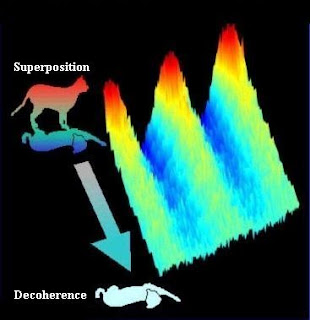One of the major obstacles to workable quantum computing is the problem of decoherence. A discovery has been reported that could pave the way for a solution...
A brief overview for those not familiar with QC: the advantage of quantum computers (for solving certain types of problem) is that the information is held in 'qubits' rather than the 'bits' used by classical computers. A bit can be 0 or 1, whereas a qubit employs quantum indeterminacy to be in a superposition of the states, a mix of 0 and 1 simultaneously. This has an important effect on scaling - the processing power of a classical computer scales linearly with the number of bits, whereas the power of a quantum computer scales exponentially (2
n) with the number of qubits (1,2,4,8,16,32 etc rather than 1,2,3,4,5,6).
Perhaps the most significant obstacle to achieving a workable quantum computer is the fact that these qubits aren't stable. Their superposed quantum 'part 0 part 1' state tends to collapse extremely easily to the classical 0 or 1 values. Heat, light, sound, vibrations, magnets, any interaction with the external physical environment, can collapse the system and we lose the quantum data.

The problem is exacerbated as the complexity of the system (the number of qubits) increases. This means that it is extremely difficult to hold information in a quantum system for any length of time. The world record (as far as I'm aware) is from
Nov 2019 at 75 seconds.
However
research by a team from Munich has revealed a possible solution to the problem. They have identified a form of quantum quasiparticle that reforms after it decays, and so essentially can persist forever and retain that quantum data.
The discovery has only recently been made*, so a lot of work needs to be done to exploit this in a working model, but still, there is the tantalising possibility that the decoherence problem may have a solution, and we are moving ever closer to workable quantum computers.
(I wanted to append this post to the
main QC thread, but I am the latest contributor there and didn't want to be accused of bumping - hope it's okay as a new thread)
*June, but flew under the radar a bit and is only really making the news this week.


